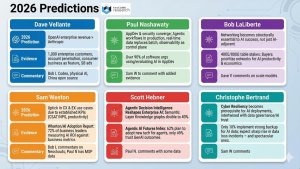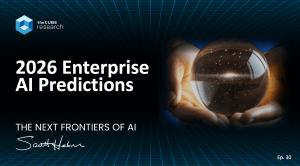The News
Kong Inc. released its latest report, Agentic AI in the Enterprise: Paving the Path to Production, revealing that 90% of enterprises are actively adopting AI agents, and 79% expect full-scale adoption within three years. The study, based on responses from 550 developers and IT leaders, highlights how APIs and governance frameworks are becoming the backbone of enterprise agentic AI strategies. Read the full report here.
Analysis
Agentic AI has quickly evolved from lab experimentation to operational strategy. Findings from our Day 2 Studies echo this shift with 74.3% of enterprises listing AI/ML tools as top investment priorities, while 64% say they are “very likely” to increase AI spending over the next year. Kong’s findings also reinforce this trend, illustrating a market-wide movement toward autonomous, API-connected systems capable of handling real-time decision-making, data retrieval, and execution without direct human supervision.
As organizations pursue efficiency and speed, developers are now expected to design systems that allow agents to safely access and act on business data. This requires API consistency, versioning discipline, and real-time observability, areas where Kong and other API platforms are positioning themselves as critical enablers.
Governance and Gateways Take Center Stage
Kong’s study touches on a reality many teams already face: the barrier to scale is not building AI agents but controlling them – 31% of respondents cited integration complexity, while 28% pointed to security and compliance as adoption hurdles. ECI Research’s Day 2 Observability findings support this with 44.4% of organizations now using observability to improve security posture, and 54% have adopted full-stack observability as a means to maintain visibility across complex systems.
Kong’s concept of an AI Gateway (a centralized “control plane” for agentic systems) aligns with a growing market category. These gateways unify API traffic, credentials, and policy enforcement, aiming to give developers a single governance layer to ensure agents operate within approved limits. This approach reflects the rise of the Model Context Protocol (MCP) and AI Development Layer frameworks discussed in FinOps Foundation and theCUBE Research coverage, both emphasizing interoperability and guardrails in distributed AI ecosystems.
Scaling with AI Gateways
Before the introduction of AI gateways, developers often relied on manual API provisioning and ad hoc governance, which are solutions that work at small scales but collapse under distributed workloads. According to theCUBE Research and ECI, 50.7% of developers still use manual processes for infrastructure configuration, and 41.1% cite security visibility as a top challenge. This fragmentation limited the safe deployment of autonomous agents that need reliable, context-rich data access.
Many organizations have compensated with patchwork integrations, such as API tokens in CI/CD pipelines, custom rate limiters, and rule-based scripts, but these approaches do not scale to agentic ecosystems, where hundreds of micro-decisions and external calls may occur per second.
Agents as First-Class API Consumers
Kong’s report signals that the future of software development is agent-aware architecture. Developers will increasingly need to think in terms of APIs for agents, not just for applications—meaning endpoints that are self-describing, auditable, and governed in real time. With 89% of enterprises establishing AI governance frameworks, the groundwork for this transition is already underway.
As we have noted, the emergence of AI gateways creates a connective tissue between AI, APIs, and compliance, enabling developers to balance velocity with trust. Over time, these systems could evolve into adaptive API fabrics, dynamically routing requests and enforcing contextual rules across multi-cloud environments.
Looking Ahead
Agentic AI is shaping the new definition of the “developer platform.” The convergence of AI orchestration, API management, and observability is forming the next layer of enterprise automation: the AI Development Layer. With 79% of organizations expecting full-scale adoption within three years, developers must prepare for systems where agents, not humans, are the primary API consumers.
For Kong, this report positions its Konnect platform as part of a broader trend that unifies APIs, AI governance, and developer productivity under one roof. But beyond any vendor, the message to developers is to build for autonomy, govern for scale, and design APIs as living systems.



